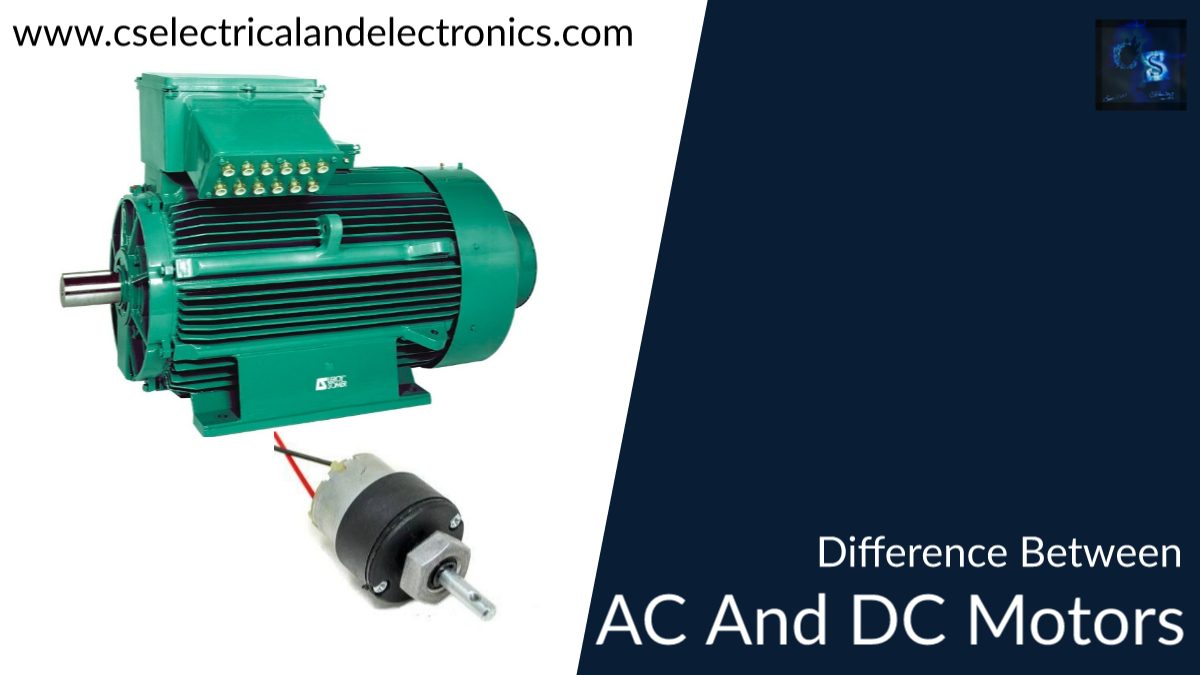Difference Between AC And DC Motors, Electrical Engineer Must Know
Hello guys, welcome back to our blog. In this article, we will discuss the difference between AC and DC motors in terms of different factors like construction, speed, maintenance cost, etc.
If you have any electrical, electronics, and computer science doubts, then ask questions. You can also catch me on Instagram – CS Electrical & Electronics.
Also, read:
- Top 100+ Electrical Abbreviations A First-class Engineer Must Know
- Top 20 Innovations In The Automotive Industry, Automotive Technologies
- Top 10 Electrical Wire Manufacturing Companies In The World
Difference Between AC And DC Motors
- AC motor: Mainly for industrial applications, agriculture, commercial, domestic, etc.
- DC motor: For domestic appliances and also for special purposes we use these dc motors in industries or commercial purposes.
01. The ac motors are supplied with alternating currents that have frequency whereas the dc motors are supplied by the direct current and there is no frequency in dc.
02. In the ac motors, except for 3 phase induction motor all are not self-starting motors because of the absence of a rotating magnetic field for creating that RMF, in the synchronous motor, we give the rotor dc supply. For the single-phase motors we will connect an auxiliary winding across armature winding to create RMF and to start the motor, whereas in dc motors all are self-starting motors.
03. In the ac motor, we do not require any commutator because we do not want to convert supply, whereas in dc motors we require the commutator for converting supply.
04. There is no requirement for brushes in the ac motors. we require brushes in dc_motors.
05. In ac motors, we have a single-phase (phase and neutral) and 3-phase (RYB, red, yellow, blue we have three terminals) motor whereas in dc motors we have only positive and negative terminals to give input to the motor.
06. In the ac motors, the stator is standstill and provides the rotating magnetic field to the rotor to rotate and in the dc motors the field winding is at a standstill and the armature rotates.
07. In the ac motors, the speed is controlled by the changing frequency or V/F method whereas in dc motors the speed is controlled by changing the armature current method.
08. In the ac motor if the load changes suddenly the response of the motor is slow and in the dc motor if the load changes suddenly the response of the motor is quick and accurate.
09. The dc motors are mainly used for variable speed and high torque whereas the ac motors are used for variable torque and high speed.
10. The maintenance cost of the dc motor is expensive because of the commutator and brushes whereas in the ac motor, the cost is less because of the absence of the commutator and brushes.
11. From the efficiency point of view, the ac motor is less efficient because of current loss and motor slip whereas the dc motor is more efficient because of the absence of current loss and slips in the motor.
12. The life of an ac motor is more because no commutator and brushes are used in the motor and the life span of the dc motor is limited because of the commutator and brushes.
13. The starters used for ac motors are DOL starter, star-delta starter, auto-transformer starter, soft starter, etc. The starters used for dc motors are a three-point starter and a four-point starter.
Conclusion: You can buy a motor based on your requirement. First, see whether you want a motor of high starting torque or high speed or low energy-consuming motor, etc.
These are the difference between ac and dc motors. I hope this article may help you all a lot. Thank you for reading.
Also, read:
- Types Of Errors Found In MiL, SiL, And HiL Testing
- Top 100 StateFlow Interview Questions With Answers
- Designing An Automotive Test System For ECU Validation
- Top 30 Automotive-Specific ISO Standards Every Automotive Engineer Must Know
- Hazard Identification Techniques In Functional Safety (FuSa) ISO 26262
- Troubleshooting CAN Communication Failures In A Test Environment
- Code Generation In MATLAB Simulink, Things To Be Followed For Efficient Code Generation
- Variable-Step Solvers In MATLAB Simulink: Which One To Select

